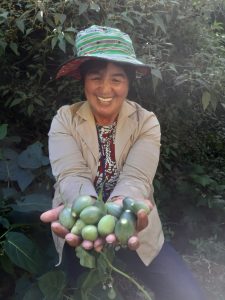
Cordillera Administrative Region- After a three-hour drive from Baguio City traversing Halsema highway, one can reach the municipality with green trees, peaks enveloped in clouds, and vigorous vegetation everywhere- Bauko, Mountain Province.
The Municipality of Bauko is one of the ten (10) municipalities of Mountain Province. It is a fourth class municipality composed of twenty two (22) barangays accustomed with rolling mountains and rugged terrain.
People living here lead simple lives, but nevertheless lend fascinating expertise to its landscape.
Agriculture is the primary source of livelihood in Bauko where they plant high value crops. Productivity is often times failing due to various factors brought about by natural and Man-made conditions. Among the natural conditions affecting agricultural production in the municipality is the inconsistent weather such as the prolonged dry season that causes crops to dry out and excessive rainfall that rots the crops while man made factors include over cultivation of the lands which leads to poor soil fertility. Both result to poor harvest or low level of income among farmers, which could not sustain decent living for their families.
To mitigate the effects of poor productivity among farmers, efforts have been carried out by the Local Government Unit (LGU) through the introduction of crop diversification such as fruit cultivation to help the farmers have alternative source of income.
The Sweet Beginning
The idea of Tamarillo Production was then considered to meddle the situation of poor production and increase income of farmers from the different sectors including person with disabilities (PWD), solo parent, women, senior citizen and indigenous people while ensuring sufficient fruit supply in the municipality.
The locals in the municipality call it as “Dulce” from its common name Tamarillo. It has been observed that this fruit can easily grow to any type of soil. Tamarillo is viable for cultivation and known to be the most neglected enduring fruit that does not require technological inputs and does not require excessive amount of capital. Due to its topographical location, tamarillo production is well suited with the temperature in the municipality.
Through the cash for work (CFW) under the Risk Resiliency Program (RRP) on Climate Change and Disaster Risk Reduction (CCAM-DRR) of the Department of Social Welfare and Development (DSWD), the Municipality of Bauko was assisted on their Tamarillo Production.
The CFW is a program directly implemented by the LGU through a project proposal approved by the DSWD-CAR. The proposed project is then evaluated using a set criteria in relation to environment protection, food security, climate change mitigation, and disaster risk reduction. Once the proposal is approved, the LGU will conduct awareness campaign to the identified eligible beneficiaries before implementing the approved project. Eligible beneficiaries include families or individuals who are considered vulnerable or at risk and are victims of calamities or disasters.
On September 2018 selected beneficiaries from various sectoral groups of the 7 barangay of Bauko implemented the tamarillo production. The project aims to help them engage into crop variation to get rid from traditional farming that used too much farm inputs.
They were granted an amount of Two Hundred Twenty Five Thousand Pesos (PhP 225,000.00) with each beneficiary receiving an amount of PhP 2,250 considering the 75 percent of the Regional Wage set by Department of Labor and Employment (DOLE).
The Department uses the minimum wage rate set by the DOLE in every locality, which may change from time to time, as reference in computing the actual rate of assistance to minimize market distortion, target the most economically disadvantaged individuals, ensure that the cash-for-work projects will not entice people away from their regular livelihood activities, and capture wage variations in the area.
The beneficiaries planted 5,000 tamarillo trees by which each beneficiary planted 50 tamarillo cuttings. Part of their counterpart is the provision of tamarillo cuttings since most of the beneficiary are farmers. These were planted on their gardens, backyard and available lots.
However, most of the planted cuttings died due to consecutive disasters that affected the municipality. But the beneficiaries was able to recover damaged crops by planting new tamarillo cuttings and dry some seed of ripe tamarillo for germination of new seedlings.
According to Julie Pawid, 49 yrs. old, beneficiary from Barangay Leseb, aside from receiving the cash for work assistance amounting to 2,250.00. They are much determined to continue the production as part of their commitment in the sustainability of the project.
“We are glad with the support given by the LGU-Bauko and DSWD-CAR in helping us to make tamarillo production project possible”. Pawid added,
Pawid also mentioned that she is not fond of eating tamarillo because of its bloodlike juice. However, she gained interest when she have known that tamarillo has good benefit to the body and environment.
Reaping the fruits of labor
“During the seminar, I have learned that it is good for the health while the fruits and it leaves will help control the bad gases in the environment that is why we planted and we decide to reproduce this kind of tree”, Pawid said.
Meanwhile, Eulalia Camyas, 60 yrs. old from Barangay Leseb revealed that tamarillo fruit is an alternative food for their children when they go to school in lieu of junk foods.
When tamarillo tree has developed its foliage, it will contribute to ecological balance and climate change mitigation by absorbing carbon gases. It will play a vital role in reversing the effects of climate change through the reduction of carbon gases and the control of soil erosion incidents by absorbing the rainwater.
The potential of tamarillo production to Municipality of Bauko brings employment to sectors as additional income while contributes to food security among disadvantaged communities of Bauko.
Aside from its health benfits, the fruit is seen to help in the economic situation of the farmers in Bauko. Tamarillo has already been existing in the markets of the municipality of Bauko.
Jonalyn Sawac, 32 yrs. old, from Barangay Sinto was able to sell 5 kilos of tamarillo fruit to Happy House Café at Sinto,Bauko for an amount of 20 pesos per kilo comparing to rice farmers who only sell rice grain to only 12 pesos per kilo.
Sawac added if Typhoon “Ompong” and “Rosita” did not damage their crops there will be more harvest and can sell 20kgs or more.
“We also tried to sell the fruits in Bontoc public market but it seems that the public is not aware of the fruit leading to none of them buying the fruit” she added.
Tamarillo fruit was also processed into wine just like the “tapey” or rice wine produced in the province and jam used as sandwich spread.
Brenda Laos, 33 yrs. old cashier of Happy House Café of Barangay Sinto also said that they tried to process tamarillo fruit into jam and most of the byproducts were sold. One kilogram of ripe tamarillo fruit can produce 10 bottles of jam and were sold at amount 90 pesos per bottle.
But the project also had its bittersweet moments. Since release of payments through cash advance was based on the aggregated good projects submitted by the municipalities in the region, there were delays in payment. But through strong partnership with the LGU, the situation was explained to the beneficiaries. It was instilled to the them that the payment is just one of the benefits in joining the program and what matters most is that they were able to bridge the gap between environmental conservation and environmental protection through CCAM cash for work efforts.
Upon the completion of documents that were found to be consistent and valid, payment for cash for work was released.
Despite the challenges, the project was chosen to be presented in the Climate Change Partnership forum held on 11 October 2019. For now, the project is still existing and the LGU plans to expand the project this 2020 still through the Cash for Work program of the DSWD. #DSWD-CAR, SOCIAL MARKETING UNIT, Jerome Padilla and Nerizza Faye G. Villanueva




